Be Prepared – Not Scared: Tech Support Scams & Microsoft Support Scams Are Everywhere!
Preface:
Each week we receive several emails from people who have been scammed by either a Microsoft support scam or another support scam. We are reprising this article because it’s important that you know what these scams look like, how they work, and how they try to trick you. If you read this article and you look at the images of some of these scams, then you’ll be better prepared and you won’t fall prey to these criminals. We are trying to keep you safe – and keep you from wasting your money on these kinds of scams.
BE PREPARED, NOT SCARED!
In a hurry? If you want to skip the why and get to how to get rid of these scams popups, click here. We hope you’ll read this entire article so you’ll recognize these scams on sight. If you know what’s coming, you can be prepared. And if you’re prepared you won’t be scared and panic.
In this article we’re going to explain how these scams work, how to get rid of them if you see them, and show you some examples so you will recognize them when you see them. And if you spend enough time on the Web, you will see one of these scams.
Whether it’s a Microsoft support scam or any tech support scam, you need to know these kinds of scams abound- and sooner or later, you’re probably going to run in to one.
We receive several emails each week from folks who encounter these kinds of scams and are convinced their security software has let them down now they’re infected. But it’s not true. Most of these support scams are carefully crafted advertisements cunningly created to make them appear to be warnings coming from your own computer or from Microsoft.
Because it seems these tech support scams are back in full vigor, we hope you’ll read this article, look that the images here, so that you’ll know, right away, when you’ve encountered one of these tech support scams. Remember: The actual warning you see may look a bit different [the most popular tech scam going around at the time of this writing what we call the “You-have-been-infected-with-the-xxxx-Virus” scam.
Whatever the virus of the day is supposed to be, the name whatever the name is it will be terrifyingly awful sounding. But stay calm. It’s a fake
In the past, many people who have run into the Tech Support or Microsoft Tech Support Scam have been contacted by scammers and warned by telephone that their computers are infected or compromised.
But it seems now, the fake “your computer is infected with **whatever the name of the non existent virus/Trojan is ** or the ** your computer has been compromised and your personal information is at risk** – or the even scarier **If you don’t click this – all the data on your hard drive will be erased* popups that appear, seemingly out of nowhere, when browsing the web. Many appear to be coming from your own computer.
All of these fake “Your computer is infected” or “Your computer is compromised” or other dire warnings that pop up out of nowhere, are popups ads. They’re not viruses, or Trojans or malware. They’re ads that try to trick you into into calling a phone number for support. They’re scams.
And regardless how many times the scam popups mention Microsoft or show the Microsoft logo, or how many times the ads refer to “Certified Microsoft Technicians” there’s a 100% certainty that they’re scams.
We have warned our readers about scams many times, but we are once again seeing more and more people losing a great deal of money to these criminals… and many times they’re being tricked because they see the Microsoft logo or Certified Microsoft Technicians on the fake warning, and that convinces them the warning is legitimate and they let down their guard and call the phone number and then allow the crooks access to their PC.
Please remember this!
Microsoft is never going show you a popup warning you that your computer is infected or compromised. Microsoft is never going to show you a popup with a telephone number and urge you to call Microsoft Support to fix or clean your PC. Never. Not today. Not tomorrow. Not ever.
No legitimate security software is ever going to tell you that your files are going to be deleted if you close a dialog or window… or tell you to call a phone number . Not even the worst legitimate security software would do that. Not today, not tomorrow, not ever.
For this article we’ve collected some of these fake warning popups, and we posted them at the bottom of this article. Keep in mind, these are just a very few of the many variations of scam popups out there… there are hundreds of them. Some have different wording, slightly different colors, some look more realistic than others, but they all have the same mission: To get you to call a number so they “fix” the non-existent virus infections, computer problems or errors.
People who do call, will be told that the “technician” needs to connect to their PC so they can run special scans. The scans, of course, are fake and always turn up dozens, sometimes hundreds of infections, errors and problems. Not to worry, they’ll tell the victim… they all can be fixed… for a price. We have heard from people who have been bilked out of hundreds of dollars. One person who wrote us recently, lost $1000 on this kind of scam.
There’s a version of the support scam or Microsoft Tech Support Popup Scam, where the victim calls a phone number and the technician runs the fake scan or scans, then tells them what’s wrong (all fake) then tells them they need to buy a couple hundred dollars worth software programs to clean, fix and protect their computer and their privacy. Of course, they’ll want your credit card number – would you actually give your credit card number to a criminal? No, of course not. But because people think they’re dealing with Microsoft, they do give out their credit card numbers and lose hundreds of dollars to scammers.
Please do not fall for these kinds of scams. If you should see a warning that your hard drive will be wiped if you close your browser, that is not true.
BE PREPARED… NOT SCARED!
When you see one of these fake popup alerts or warnings, Here’s what you need to do:
1.) Use CTRL + F4 to close the offending browser tab (Press the CTRL key and the F4 key on the top row of your keyboard).
And…if that does not work…
2.) Press ALT + F4 to close all open browser tabs.
And…if that does not work…
3.) Open Task Manager by pressing the CTRL+SHIFT+ESC keys. In Task Manager, click on the “Processes” tab at the top. In the list of processes, right-click on each instance of your browser you see running and choose “end task”. Note: Google Chrome usually shows a process for every tab open and every Chrome extension running. You’ll need close as many of these as necessary until you see the browser window with the scam in it close. Browser processes for the most popular browsers show as chrome.exe, firefox.exe, iexplore.exe (for Internet Explorer) and Microsoft Edge.
And if you still can’t get the scam advertisement(s) closed:
4.) Press and hold down the Windows key and tap the R key. Type SHUTDOWN /R in the Run box and press Enter. This will restart your computer and close all open programs.
Make sure when you restart your browser or your computer, when your browser asks if you want to restore the tabs that were open, you want to decline – otherwise, there’s a good chance you’ll find yourself right back where you started with the scam popup.
If you’re prepared, you won’t panic. When you panic it’s hard to think straight. So…
BE PREPARED – NOT SCARED.
We want you to be safe. Don’t be tricked by these sophisticated thieves and con artists. Remember what you read here and remember what you saw here. Be wary – not paranoid. Don’t panic. Think. And remember:
Microsoft is never going show you a popup warning you that your computer is infected or compromised. Microsoft is never going to show you a popup with a telephone number and urge you to call Microsoft Support to fix or clean your PC. Never. Not today. Not tomorrow. Not ever.
As promised, here are some screen shots of a few of these scam popups. Remember: These are only a few of the hundreds of different scam popups out there – but most tech support scams use the same basic techniques to get you to all a phone number for help. All the references to Microsoft are just to lure you into to trusting the scammer. Microsoft has nothing to do with any of these scams.
BE PREPARED – NOT SCARED!
SOME SAMPLES OF WHAT THESE KINDS OF SCAMS LOOK LIKE – THEY MAY LOOK REAL BUT THEY ARE ALL SCAM ADVERTISEMENTS FOR FAKE TECH SUPPORT OR MICROSOFT SUPPORT SCAMS. THEY MAY APPEAR TO BE COMING FROM YOUR OWN COMPUTER – THEY ARE NOT. THEY ARE COMING FROM THE WEB.
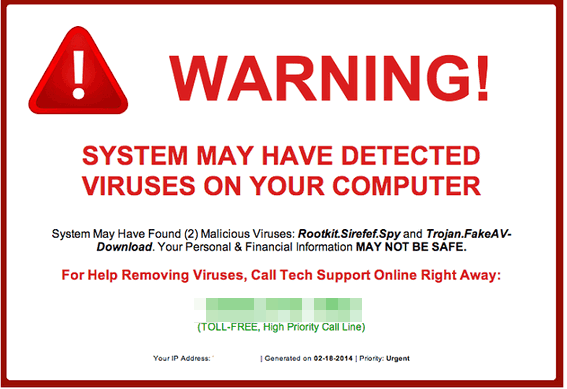
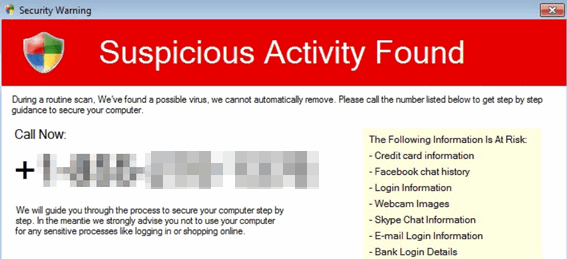
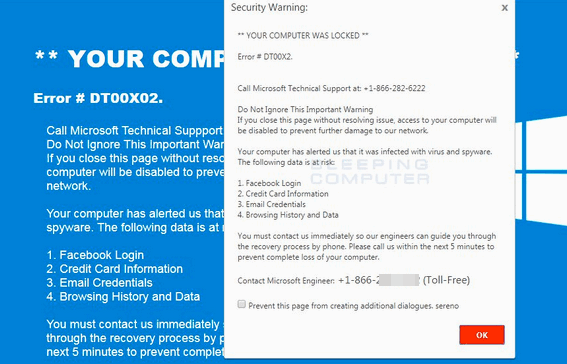
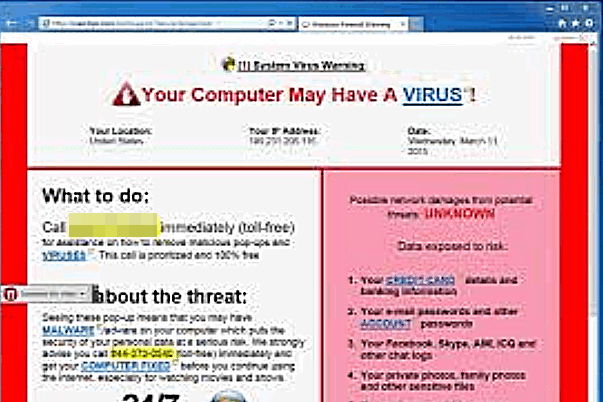
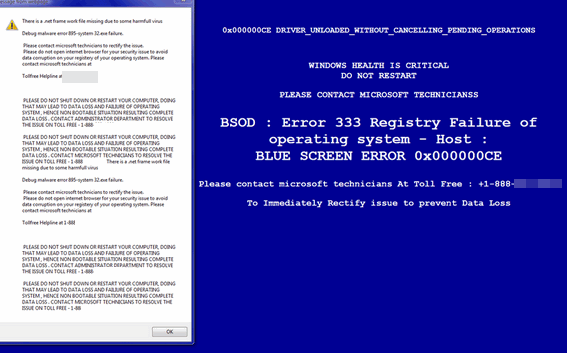
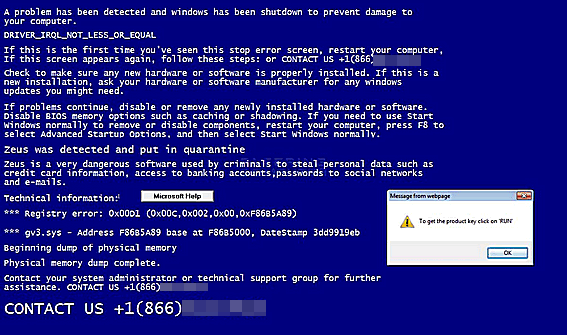
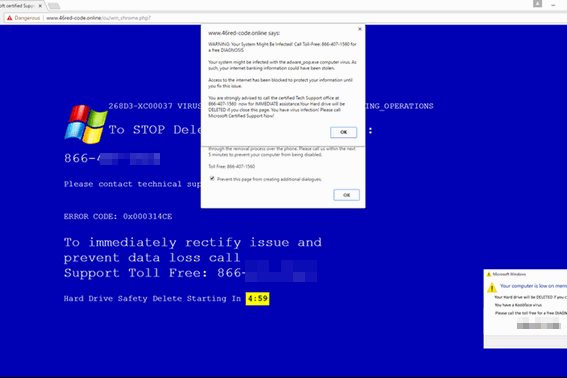
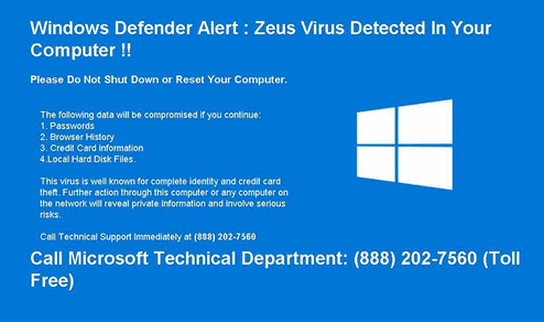
All of images above looks authentic … very real. Their messages vary; most are dire. But… they are ALL SCAMS, folks.
Here are some more images and they are all scams too.
Forewarned is forearmed. Commit these images to memory so if/when you encounter one one similar to these you’ll know exactly what to do.
BE PREPARED – NOT SCARED!
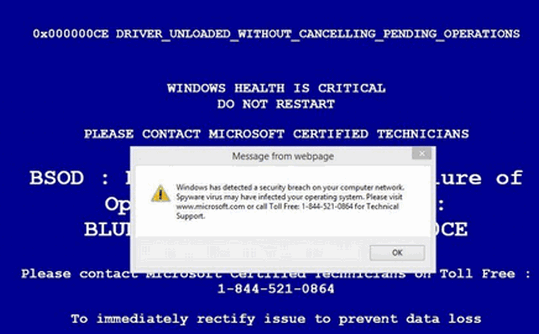
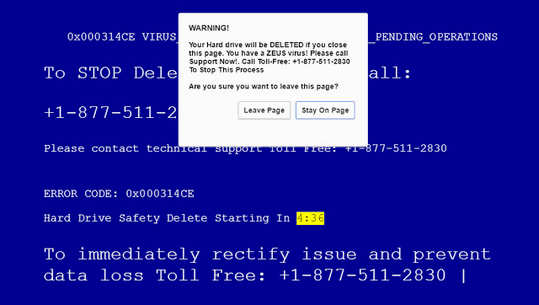
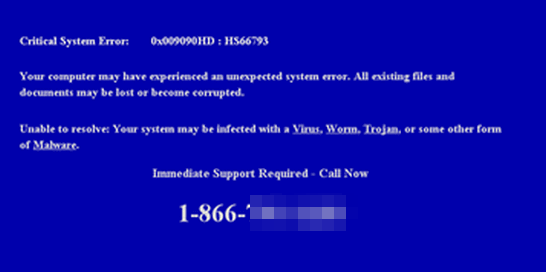
Oh my! My data is going to be lost or corrupted if I don’t call that number! Woe is me. NO! Not woe is me. It’s just a tech support scam.
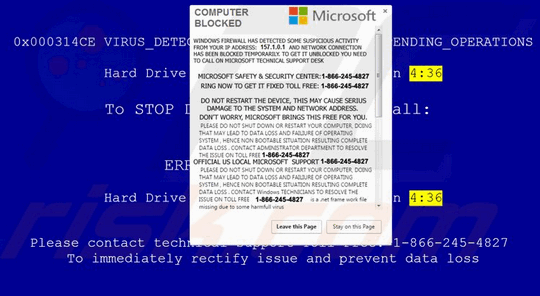
Above: Another scam. This one is verbose. All kinds of dire warnings and not-so-veiled threats in this one. But it’s just a scam. It’s a scam I tells ya!
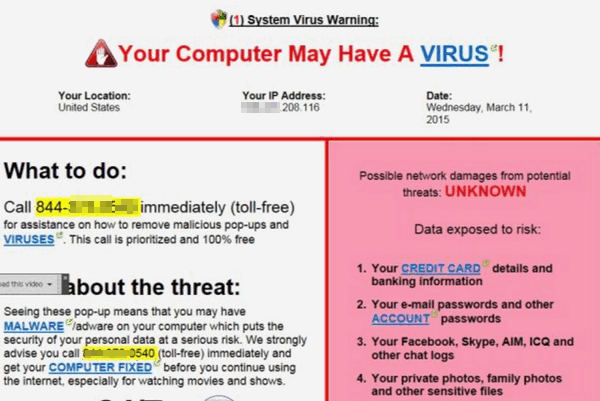
Above: Note the dire warnings that your bank account and credit card details are at risk. In this case, they’re not lying. They are very at risk if you fall for this scam. As you can see they add your IP address and the date to make it look official. That’s easy to do. This scam has been making the rounds for years.
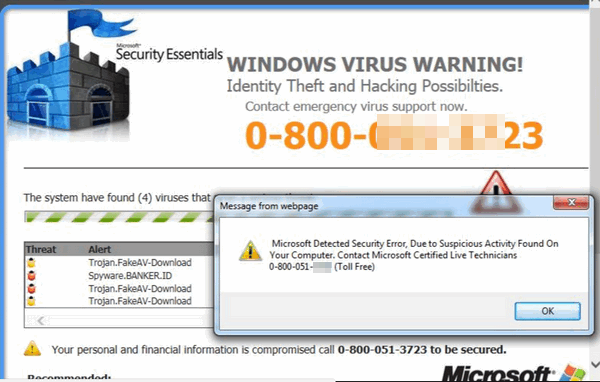
Above… don’t let all the Microsoft logos and “Microsoft Certified Live Technicians” trick you. This is all a scam and it’s not coming from your computer. Notice at the top of warning it says “Message from webpage”. A dead giveaway that this scam did not come from your PC, but from the Web Plus, if you’re not using Microsoft Security Essentials… DUH! You should immediately recognize this as a scam.
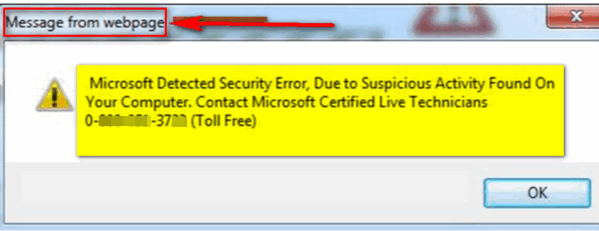
Above: The scam up close. Notice “Message from webpage”. That tells you that this popup did not come from your PC, but it’s just a popup ad from web page. Notice they don’t use “Microsoft technicians”, but “Microsoft Certified Live Technicians”. What else would they say, dead Microsoft technicians? They’re not technicians at all – they’re thieves, miscreants and criminals out to get your money.

Another “Microsoft” alert. It’s not from Microsoft, it’s not from your PC. It’s just a web page popup ad. Again we have the “Microsoft Certified Live Technicians” back for an encore. When will they start using dead technicians? Live or dead, this is just another scam.
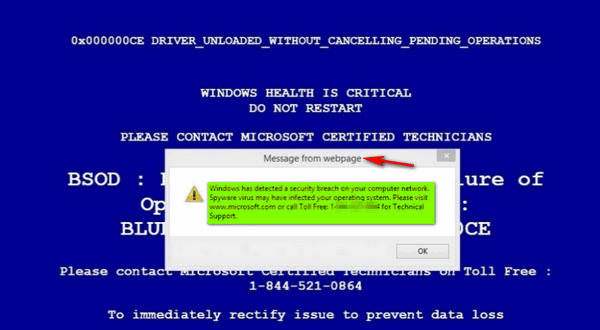
Above: Are you getting the idea that there are an endless number of scams out there trying to trick you and steal your money? There are. We’re here to expose these crooks. Don’t let them fool you.
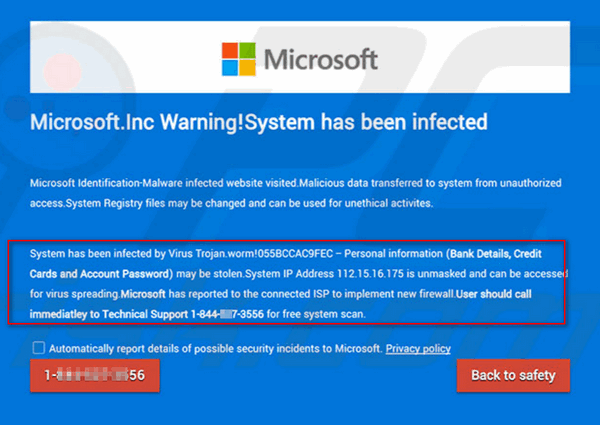
Above: A very real-looking scam pop-up, with the Microsoft logo at the top and Microsoft referenced in the body. Showing your IP address may scare some people, but your IP address is visible to every web site you visit. Want to see? Just go to http://thundercloud.net/start/useragent.htm . Your IP is part of the details your browser always shows automatically. Clicking the “Back to safety” button (above), leads you to another scam, and calling the number posted would lead you right tin o the nest of criminals that want to steal your money. It’s just another scam designed to trick you into giving up your money.
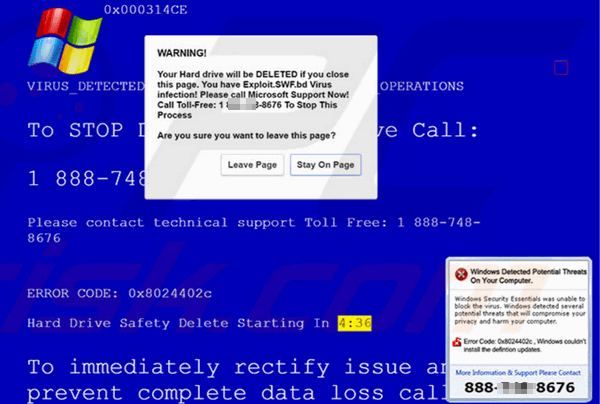
Above: Another scam with a bit of drama. It’s going to delete your hard drive contents if you close this page. However, if you close the page, the only thing that will happen is you’ll be getting away from the den of thieves behind this scam. Notice that this one tells you to call “Microsoft Support Now!” and gives you a toll-free number. But, trust us, if you do call that number, you won’t be talking to Microsoft or even a technician, but you will be talking one on one with a real, live con artist.
See the close up below. Woe is you! They’re going to delete your hard drive’s contents if you close this page. However, that will not happen. If you close this page, they criminals will just lose a potential victim.
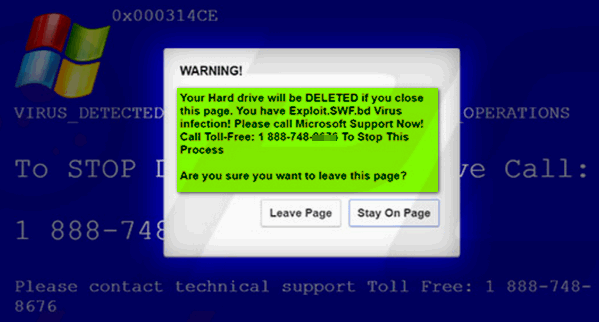
The one below is not as common these days, but it’s still making the rounds. This one’s warning tells you you’ve got a rootkit Trojan! With the scary name of ROOTKIT_TROJAN_HIJACK.EXE . Wow! They have all the key words that should send shivers down the spine of most users, but not you! By now, you know better, right? And notice the Microsoft references. This one has has been around a long time. The name of the Trojan changes, but not the scam… it’s the same old, same old.
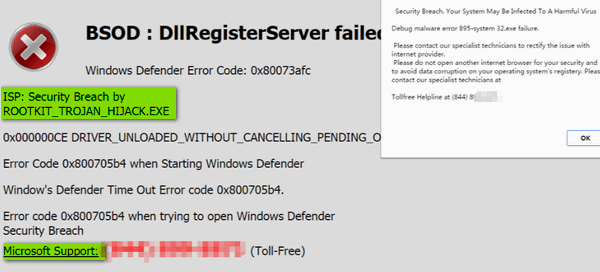
Just one more. Take a look at the image below. This scam makes it looks like you computer was scanned and lots of malware and bad stuff was found lurking on your PC. Looks like you better call and get it off or your PC will explode and your privacy will go up in a cloud of smoke (no pun intended). Notice the Microsoft logo at the bottom and the Microsoft Security Essentials logo at the top. No one using Windows 10 could possibly be using Microsoft Security Essentials, so you should NEVER be fooled by this one.
And if you are using Windows 7 and still using Microsoft Security Essentials, you should be using something better. And no matter what, you should recognize this as a scam, if for no other reason than the theatrical way they try to get you to call “Tech Support”.
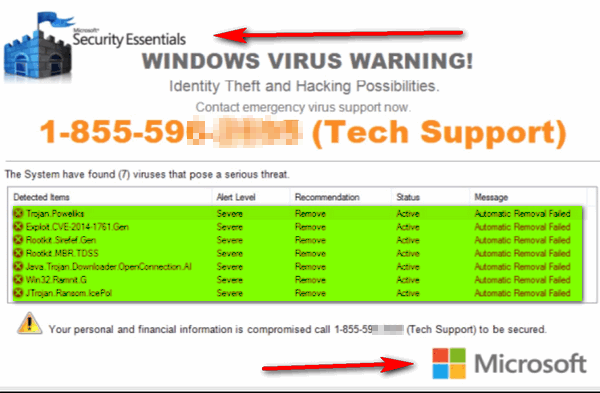
There are hundreds of these kinds of scams out there just waiting to trick you.
They may all look slightly different, but they all have the same goal… to get you to scare you and make you believe that your computer is compromised or infected – and scare you into calling a number to get your PC fixed. These are scams no matter how many Microsoft logos you see or how many times they use “Microsoft Certified Technicians”. They are scams if they show you a phone number to call, Microsoft or not. They are scams when they tell you if you close the window you’ll lose all your data.
These criminals want you to call the number shown on the warning so they can run fake scans, that show you how badly your computer is infected, and tell you that even though your PC is very badly infected or compromised, don’t you worry – they can fix you right up for a price. DON’T CALL IN THE FIRST PLACE. DON’T PAY. Do not give your credit card or checking account information to them.
If you fallen for a scam like these, call your credit or debit card company immediately and tell them you’ve been scammed. Don’t be embarrassed to admit it. Millions and millions of people are tricked by scams like these every year.
Our mission is to help keep you safe. We hope this helps article will help you to recognize a scams if and when you ever seen one.
Be safe! Not Sorry.


I’ve had these but can’t remember if Microsoft was mentioned and I just restart the computer. I did get a phone call from ” Microsoft” saying that something I had on the computer expired and wanted me to call. It came up on my phone ID. I just ignored and deleted. TY for warning us TC. They can be scary sometimes, especially when a voice is telling you not to try to delete, etc. And when you do try, you can’t by simply clicking on the red X. That is when I hit the window key and restart.
This is such a long email, I started not to read it. I mean, I’ve never fallen for one of these scams (thanks to you), but I changed my mind and read it. Now, I’m glad I did. Some of these ‘warnings’ sound so bad that I might have fallen for them. I needed the reminder. Thank you.
I have had a couple of these scams but at least I didn’t fall for them. Thanks for all this great information!
Thanks for the information, I had this happen to me several years ago and they locked me out of my computer, it was a total Nightmare!
I recently got locked out of my computer because I could not remember how to get rid of the warning. I tried some things I found on the internet but nothing worked. Now the machine will not even turn on. Not sure what my next move will be. 🙁
What do you mean you “got locked out of your computer”? Do you mean if you power off your machine you cannot power it back on? Are you referring to Ransomware or scam ads like the article you’re commenting on refers to?
first of all, don’t people realize that “Microsoft” can’t possibly see what’s on your computer in the first place. If you do not give permission, no one can see anything.
Not everyone has the same set of computer skills, computer knowledge, or trust in humanity levels, Alan. These scams generate millions of dollars each year for the crook. And it’s not always true “If you do not give permission, no one can see anything.” Ask the many companies who’ve suffered data breaches, Equifax, Yahoo, government sites, Colonial Pipeline, et. al. You don’t actually think all these companies and agencies gave the hackers and bad actors permission, do you?
Microsoft locked down my computer, involved so called FCCworker, I was so scammed. Cost me $1000.00, My daughter put in back to factory, and I lost all my pictures and documents. A heavey price to pay for believing something. Never seen this page on microsoft scames till today. Thank you for the article, even if it is to late for me. Just want to say , people beware!!